University Nursing: Law and Ethics Assessment - Case Study Analysis
VerifiedAdded on 2020/01/07
|7
|1570
|223
Essay
AI Summary
This assessment delves into the critical intersection of law and ethics within the nursing profession, emphasizing the ethical principles and moral considerations that guide nursing practice. The essay outlines various ethical codes, legal frameworks, and moral factors influencing nurses' conduct, particularly in Australia. It references international guidelines like the Universal Declaration of Human Rights and the ICN's codes of ethics. The assessment then analyzes a case study involving a registered nurse, identifying breaches of ethical and legal standards related to patient confidentiality, honesty, and patient rights. It highlights violations of principles like nonmaleficence and fidelity, contrasting the nurse's actions with the expected standards of care and professional conduct. The essay concludes by underscoring the importance of adhering to ethical, legal, and moral principles in healthcare to improve service and patient care.
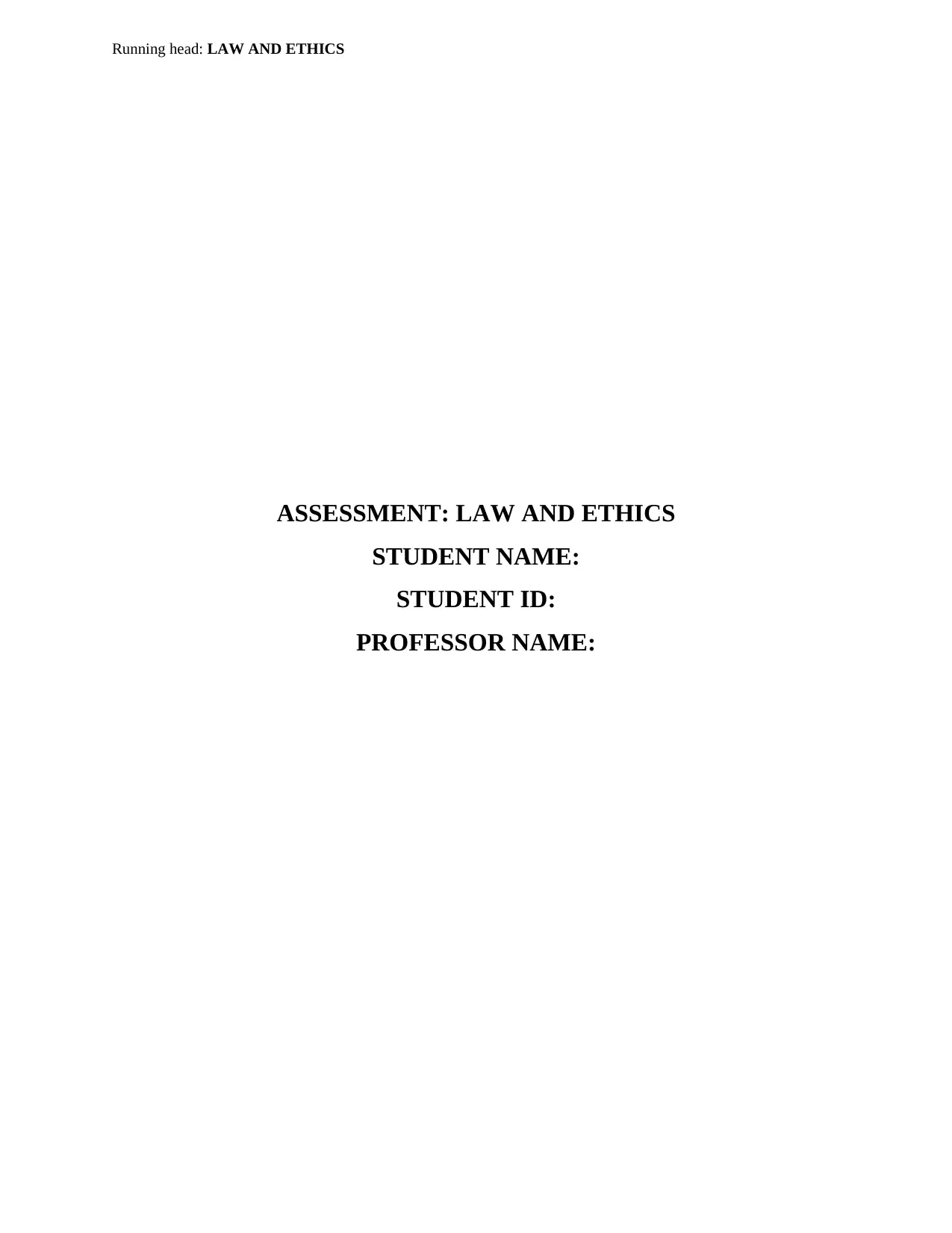
Running head: LAW AND ETHICS
ASSESSMENT: LAW AND ETHICS
STUDENT NAME:
STUDENT ID:
PROFESSOR NAME:
ASSESSMENT: LAW AND ETHICS
STUDENT NAME:
STUDENT ID:
PROFESSOR NAME:
Paraphrase This Document
Need a fresh take? Get an instant paraphrase of this document with our AI Paraphraser
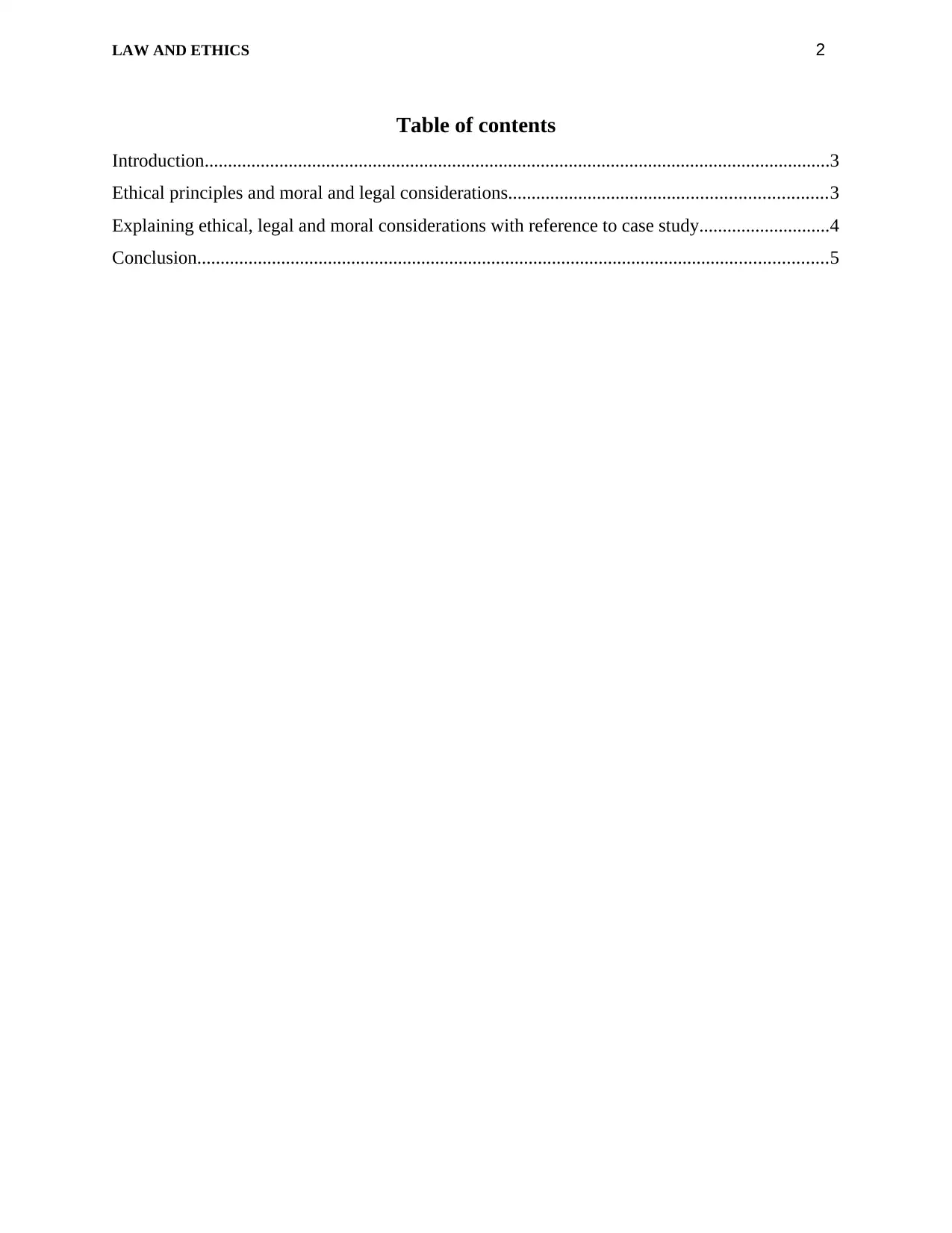
LAW AND ETHICS 2
Table of contents
Introduction......................................................................................................................................3
Ethical principles and moral and legal considerations....................................................................3
Explaining ethical, legal and moral considerations with reference to case study............................4
Conclusion.......................................................................................................................................5
Table of contents
Introduction......................................................................................................................................3
Ethical principles and moral and legal considerations....................................................................3
Explaining ethical, legal and moral considerations with reference to case study............................4
Conclusion.......................................................................................................................................5
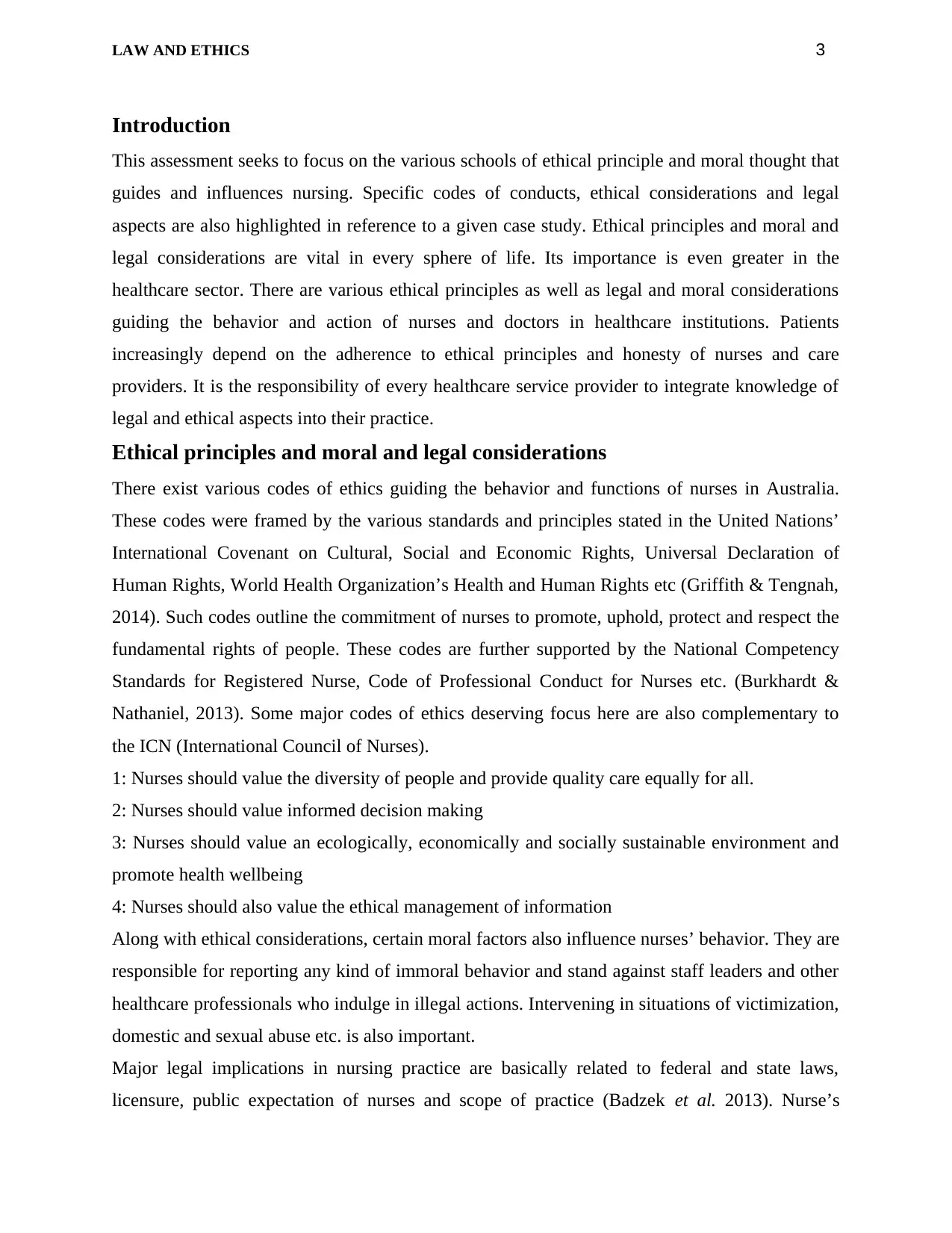
LAW AND ETHICS 3
Introduction
This assessment seeks to focus on the various schools of ethical principle and moral thought that
guides and influences nursing. Specific codes of conducts, ethical considerations and legal
aspects are also highlighted in reference to a given case study. Ethical principles and moral and
legal considerations are vital in every sphere of life. Its importance is even greater in the
healthcare sector. There are various ethical principles as well as legal and moral considerations
guiding the behavior and action of nurses and doctors in healthcare institutions. Patients
increasingly depend on the adherence to ethical principles and honesty of nurses and care
providers. It is the responsibility of every healthcare service provider to integrate knowledge of
legal and ethical aspects into their practice.
Ethical principles and moral and legal considerations
There exist various codes of ethics guiding the behavior and functions of nurses in Australia.
These codes were framed by the various standards and principles stated in the United Nations’
International Covenant on Cultural, Social and Economic Rights, Universal Declaration of
Human Rights, World Health Organization’s Health and Human Rights etc (Griffith & Tengnah,
2014). Such codes outline the commitment of nurses to promote, uphold, protect and respect the
fundamental rights of people. These codes are further supported by the National Competency
Standards for Registered Nurse, Code of Professional Conduct for Nurses etc. (Burkhardt &
Nathaniel, 2013). Some major codes of ethics deserving focus here are also complementary to
the ICN (International Council of Nurses).
1: Nurses should value the diversity of people and provide quality care equally for all.
2: Nurses should value informed decision making
3: Nurses should value an ecologically, economically and socially sustainable environment and
promote health wellbeing
4: Nurses should also value the ethical management of information
Along with ethical considerations, certain moral factors also influence nurses’ behavior. They are
responsible for reporting any kind of immoral behavior and stand against staff leaders and other
healthcare professionals who indulge in illegal actions. Intervening in situations of victimization,
domestic and sexual abuse etc. is also important.
Major legal implications in nursing practice are basically related to federal and state laws,
licensure, public expectation of nurses and scope of practice (Badzek et al. 2013). Nurse’s
Introduction
This assessment seeks to focus on the various schools of ethical principle and moral thought that
guides and influences nursing. Specific codes of conducts, ethical considerations and legal
aspects are also highlighted in reference to a given case study. Ethical principles and moral and
legal considerations are vital in every sphere of life. Its importance is even greater in the
healthcare sector. There are various ethical principles as well as legal and moral considerations
guiding the behavior and action of nurses and doctors in healthcare institutions. Patients
increasingly depend on the adherence to ethical principles and honesty of nurses and care
providers. It is the responsibility of every healthcare service provider to integrate knowledge of
legal and ethical aspects into their practice.
Ethical principles and moral and legal considerations
There exist various codes of ethics guiding the behavior and functions of nurses in Australia.
These codes were framed by the various standards and principles stated in the United Nations’
International Covenant on Cultural, Social and Economic Rights, Universal Declaration of
Human Rights, World Health Organization’s Health and Human Rights etc (Griffith & Tengnah,
2014). Such codes outline the commitment of nurses to promote, uphold, protect and respect the
fundamental rights of people. These codes are further supported by the National Competency
Standards for Registered Nurse, Code of Professional Conduct for Nurses etc. (Burkhardt &
Nathaniel, 2013). Some major codes of ethics deserving focus here are also complementary to
the ICN (International Council of Nurses).
1: Nurses should value the diversity of people and provide quality care equally for all.
2: Nurses should value informed decision making
3: Nurses should value an ecologically, economically and socially sustainable environment and
promote health wellbeing
4: Nurses should also value the ethical management of information
Along with ethical considerations, certain moral factors also influence nurses’ behavior. They are
responsible for reporting any kind of immoral behavior and stand against staff leaders and other
healthcare professionals who indulge in illegal actions. Intervening in situations of victimization,
domestic and sexual abuse etc. is also important.
Major legal implications in nursing practice are basically related to federal and state laws,
licensure, public expectation of nurses and scope of practice (Badzek et al. 2013). Nurse’s
⊘ This is a preview!⊘
Do you want full access?
Subscribe today to unlock all pages.

Trusted by 1+ million students worldwide
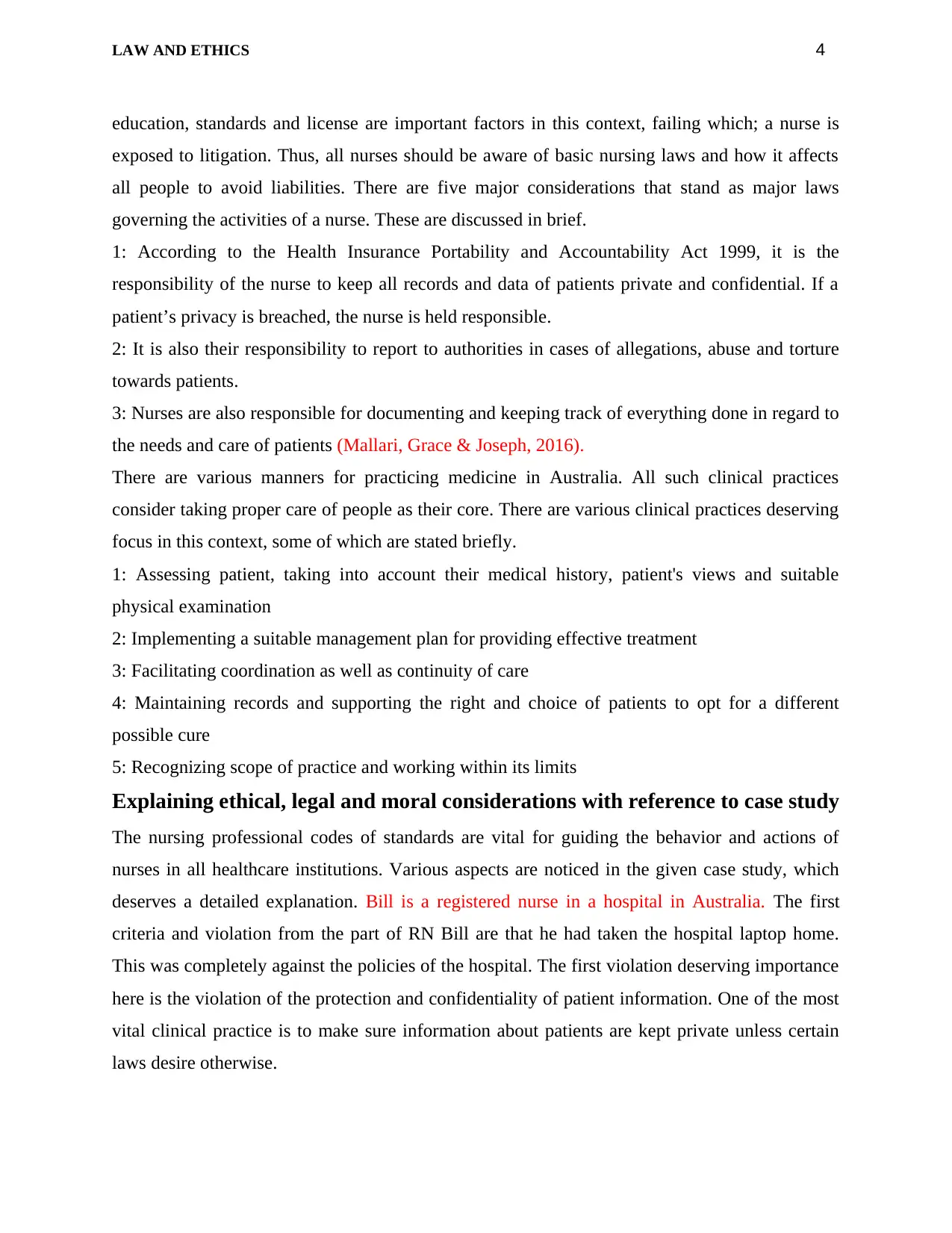
LAW AND ETHICS 4
education, standards and license are important factors in this context, failing which; a nurse is
exposed to litigation. Thus, all nurses should be aware of basic nursing laws and how it affects
all people to avoid liabilities. There are five major considerations that stand as major laws
governing the activities of a nurse. These are discussed in brief.
1: According to the Health Insurance Portability and Accountability Act 1999, it is the
responsibility of the nurse to keep all records and data of patients private and confidential. If a
patient’s privacy is breached, the nurse is held responsible.
2: It is also their responsibility to report to authorities in cases of allegations, abuse and torture
towards patients.
3: Nurses are also responsible for documenting and keeping track of everything done in regard to
the needs and care of patients (Mallari, Grace & Joseph, 2016).
There are various manners for practicing medicine in Australia. All such clinical practices
consider taking proper care of people as their core. There are various clinical practices deserving
focus in this context, some of which are stated briefly.
1: Assessing patient, taking into account their medical history, patient's views and suitable
physical examination
2: Implementing a suitable management plan for providing effective treatment
3: Facilitating coordination as well as continuity of care
4: Maintaining records and supporting the right and choice of patients to opt for a different
possible cure
5: Recognizing scope of practice and working within its limits
Explaining ethical, legal and moral considerations with reference to case study
The nursing professional codes of standards are vital for guiding the behavior and actions of
nurses in all healthcare institutions. Various aspects are noticed in the given case study, which
deserves a detailed explanation. Bill is a registered nurse in a hospital in Australia. The first
criteria and violation from the part of RN Bill are that he had taken the hospital laptop home.
This was completely against the policies of the hospital. The first violation deserving importance
here is the violation of the protection and confidentiality of patient information. One of the most
vital clinical practice is to make sure information about patients are kept private unless certain
laws desire otherwise.
education, standards and license are important factors in this context, failing which; a nurse is
exposed to litigation. Thus, all nurses should be aware of basic nursing laws and how it affects
all people to avoid liabilities. There are five major considerations that stand as major laws
governing the activities of a nurse. These are discussed in brief.
1: According to the Health Insurance Portability and Accountability Act 1999, it is the
responsibility of the nurse to keep all records and data of patients private and confidential. If a
patient’s privacy is breached, the nurse is held responsible.
2: It is also their responsibility to report to authorities in cases of allegations, abuse and torture
towards patients.
3: Nurses are also responsible for documenting and keeping track of everything done in regard to
the needs and care of patients (Mallari, Grace & Joseph, 2016).
There are various manners for practicing medicine in Australia. All such clinical practices
consider taking proper care of people as their core. There are various clinical practices deserving
focus in this context, some of which are stated briefly.
1: Assessing patient, taking into account their medical history, patient's views and suitable
physical examination
2: Implementing a suitable management plan for providing effective treatment
3: Facilitating coordination as well as continuity of care
4: Maintaining records and supporting the right and choice of patients to opt for a different
possible cure
5: Recognizing scope of practice and working within its limits
Explaining ethical, legal and moral considerations with reference to case study
The nursing professional codes of standards are vital for guiding the behavior and actions of
nurses in all healthcare institutions. Various aspects are noticed in the given case study, which
deserves a detailed explanation. Bill is a registered nurse in a hospital in Australia. The first
criteria and violation from the part of RN Bill are that he had taken the hospital laptop home.
This was completely against the policies of the hospital. The first violation deserving importance
here is the violation of the protection and confidentiality of patient information. One of the most
vital clinical practice is to make sure information about patients are kept private unless certain
laws desire otherwise.
Paraphrase This Document
Need a fresh take? Get an instant paraphrase of this document with our AI Paraphraser
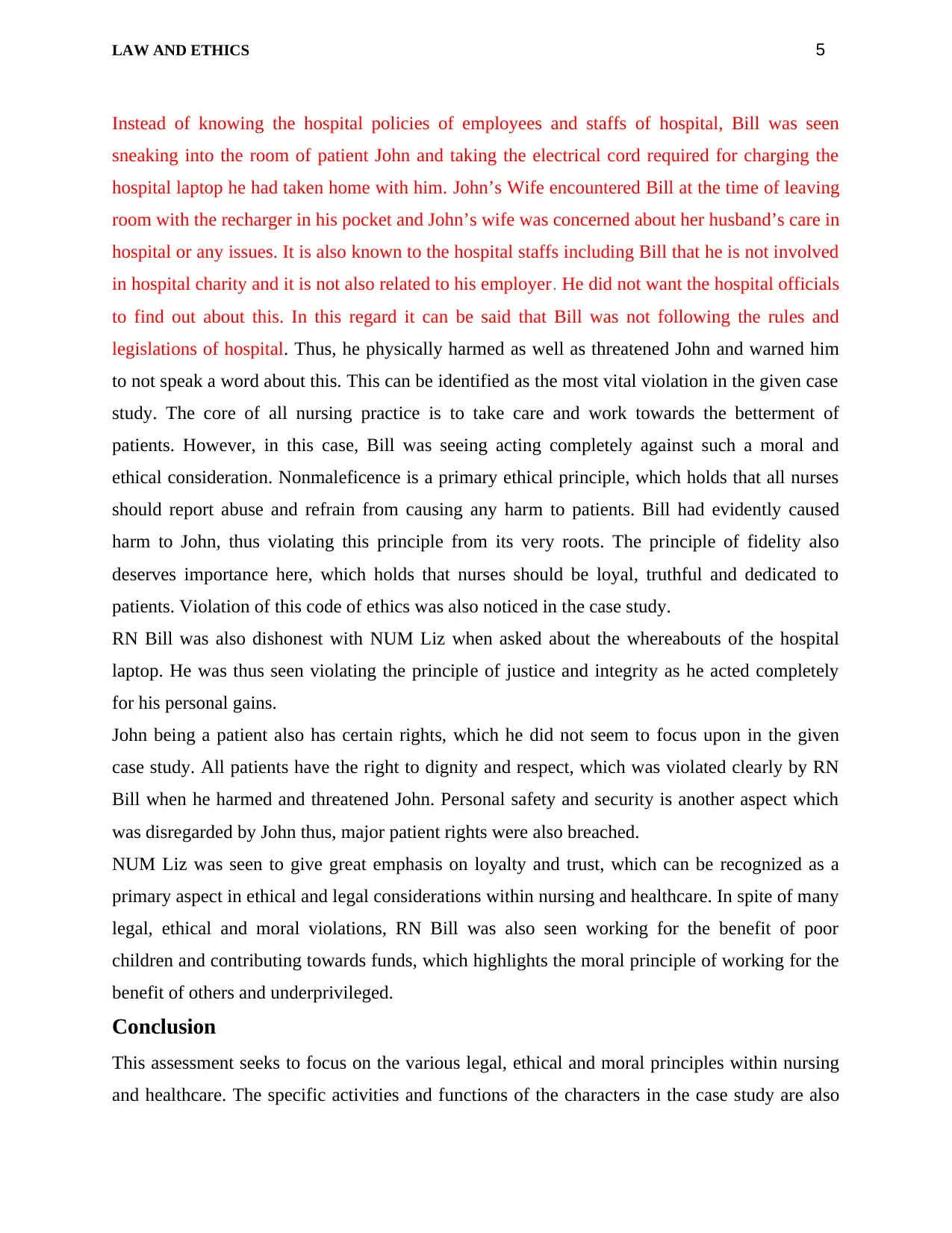
LAW AND ETHICS 5
Instead of knowing the hospital policies of employees and staffs of hospital, Bill was seen
sneaking into the room of patient John and taking the electrical cord required for charging the
hospital laptop he had taken home with him. John’s Wife encountered Bill at the time of leaving
room with the recharger in his pocket and John’s wife was concerned about her husband’s care in
hospital or any issues. It is also known to the hospital staffs including Bill that he is not involved
in hospital charity and it is not also related to his employer. He did not want the hospital officials
to find out about this. In this regard it can be said that Bill was not following the rules and
legislations of hospital. Thus, he physically harmed as well as threatened John and warned him
to not speak a word about this. This can be identified as the most vital violation in the given case
study. The core of all nursing practice is to take care and work towards the betterment of
patients. However, in this case, Bill was seeing acting completely against such a moral and
ethical consideration. Nonmaleficence is a primary ethical principle, which holds that all nurses
should report abuse and refrain from causing any harm to patients. Bill had evidently caused
harm to John, thus violating this principle from its very roots. The principle of fidelity also
deserves importance here, which holds that nurses should be loyal, truthful and dedicated to
patients. Violation of this code of ethics was also noticed in the case study.
RN Bill was also dishonest with NUM Liz when asked about the whereabouts of the hospital
laptop. He was thus seen violating the principle of justice and integrity as he acted completely
for his personal gains.
John being a patient also has certain rights, which he did not seem to focus upon in the given
case study. All patients have the right to dignity and respect, which was violated clearly by RN
Bill when he harmed and threatened John. Personal safety and security is another aspect which
was disregarded by John thus, major patient rights were also breached.
NUM Liz was seen to give great emphasis on loyalty and trust, which can be recognized as a
primary aspect in ethical and legal considerations within nursing and healthcare. In spite of many
legal, ethical and moral violations, RN Bill was also seen working for the benefit of poor
children and contributing towards funds, which highlights the moral principle of working for the
benefit of others and underprivileged.
Conclusion
This assessment seeks to focus on the various legal, ethical and moral principles within nursing
and healthcare. The specific activities and functions of the characters in the case study are also
Instead of knowing the hospital policies of employees and staffs of hospital, Bill was seen
sneaking into the room of patient John and taking the electrical cord required for charging the
hospital laptop he had taken home with him. John’s Wife encountered Bill at the time of leaving
room with the recharger in his pocket and John’s wife was concerned about her husband’s care in
hospital or any issues. It is also known to the hospital staffs including Bill that he is not involved
in hospital charity and it is not also related to his employer. He did not want the hospital officials
to find out about this. In this regard it can be said that Bill was not following the rules and
legislations of hospital. Thus, he physically harmed as well as threatened John and warned him
to not speak a word about this. This can be identified as the most vital violation in the given case
study. The core of all nursing practice is to take care and work towards the betterment of
patients. However, in this case, Bill was seeing acting completely against such a moral and
ethical consideration. Nonmaleficence is a primary ethical principle, which holds that all nurses
should report abuse and refrain from causing any harm to patients. Bill had evidently caused
harm to John, thus violating this principle from its very roots. The principle of fidelity also
deserves importance here, which holds that nurses should be loyal, truthful and dedicated to
patients. Violation of this code of ethics was also noticed in the case study.
RN Bill was also dishonest with NUM Liz when asked about the whereabouts of the hospital
laptop. He was thus seen violating the principle of justice and integrity as he acted completely
for his personal gains.
John being a patient also has certain rights, which he did not seem to focus upon in the given
case study. All patients have the right to dignity and respect, which was violated clearly by RN
Bill when he harmed and threatened John. Personal safety and security is another aspect which
was disregarded by John thus, major patient rights were also breached.
NUM Liz was seen to give great emphasis on loyalty and trust, which can be recognized as a
primary aspect in ethical and legal considerations within nursing and healthcare. In spite of many
legal, ethical and moral violations, RN Bill was also seen working for the benefit of poor
children and contributing towards funds, which highlights the moral principle of working for the
benefit of others and underprivileged.
Conclusion
This assessment seeks to focus on the various legal, ethical and moral principles within nursing
and healthcare. The specific activities and functions of the characters in the case study are also
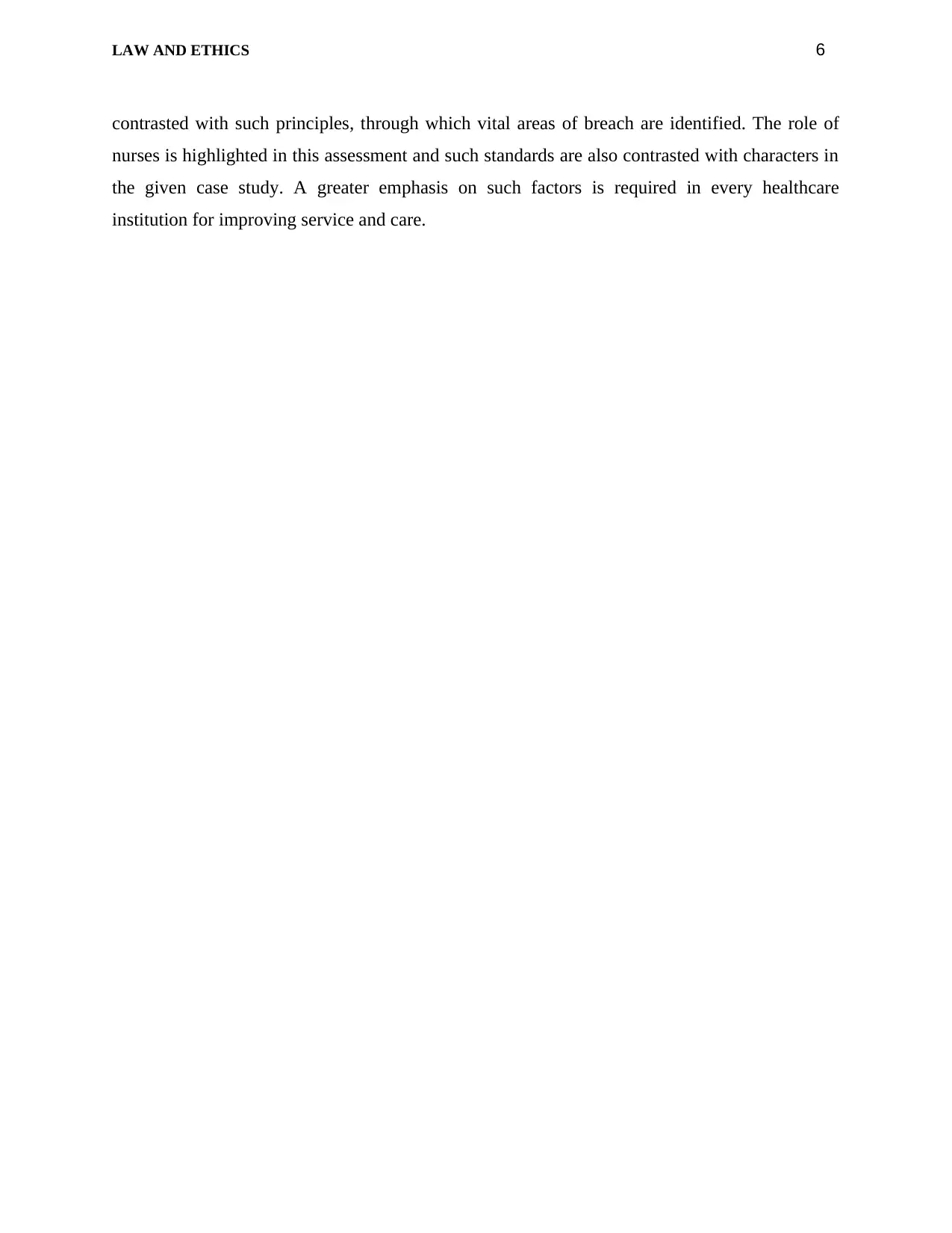
LAW AND ETHICS 6
contrasted with such principles, through which vital areas of breach are identified. The role of
nurses is highlighted in this assessment and such standards are also contrasted with characters in
the given case study. A greater emphasis on such factors is required in every healthcare
institution for improving service and care.
contrasted with such principles, through which vital areas of breach are identified. The role of
nurses is highlighted in this assessment and such standards are also contrasted with characters in
the given case study. A greater emphasis on such factors is required in every healthcare
institution for improving service and care.
⊘ This is a preview!⊘
Do you want full access?
Subscribe today to unlock all pages.

Trusted by 1+ million students worldwide
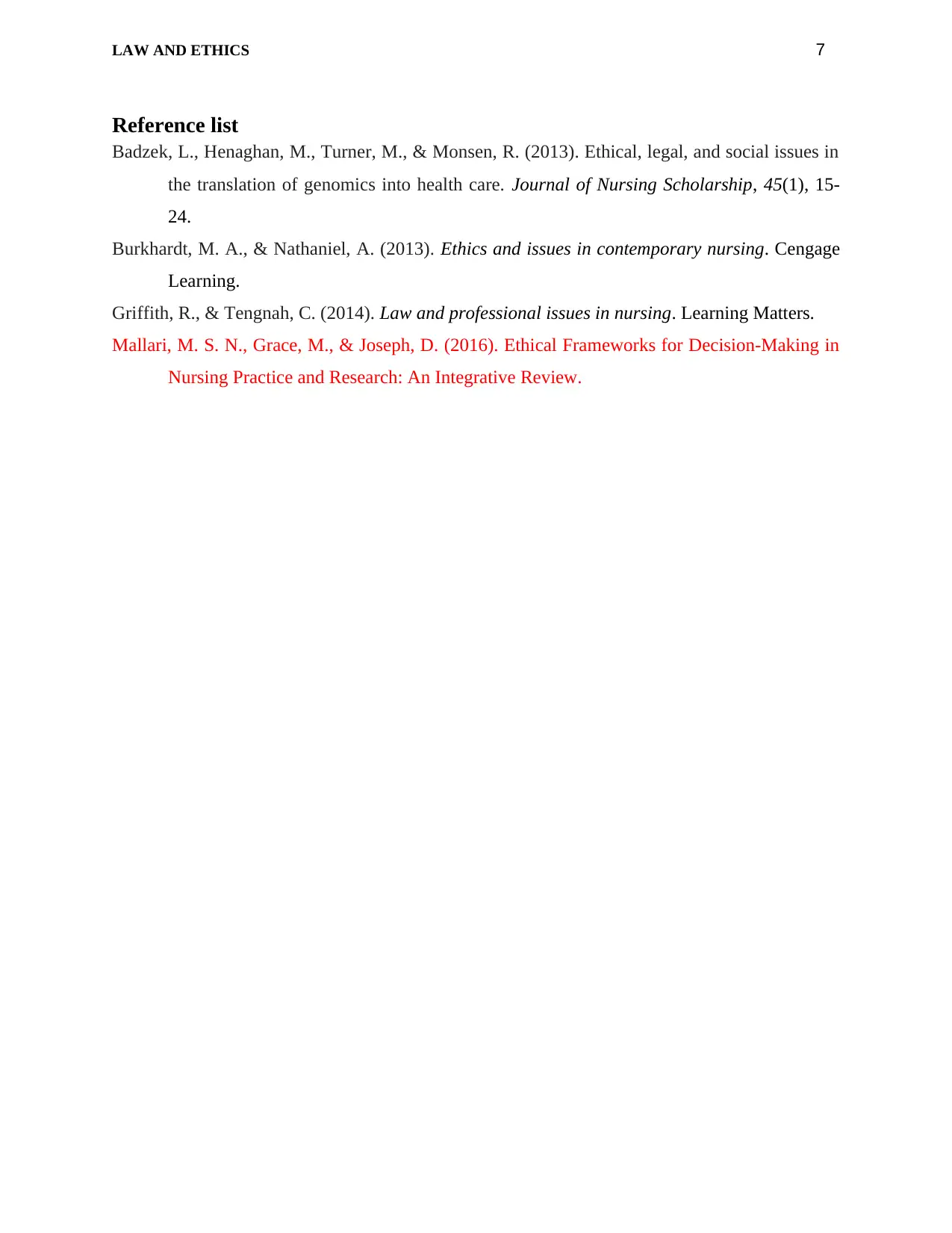
LAW AND ETHICS 7
Reference list
Badzek, L., Henaghan, M., Turner, M., & Monsen, R. (2013). Ethical, legal, and social issues in
the translation of genomics into health care. Journal of Nursing Scholarship, 45(1), 15-
24.
Burkhardt, M. A., & Nathaniel, A. (2013). Ethics and issues in contemporary nursing. Cengage
Learning.
Griffith, R., & Tengnah, C. (2014). Law and professional issues in nursing. Learning Matters.
Mallari, M. S. N., Grace, M., & Joseph, D. (2016). Ethical Frameworks for Decision-Making in
Nursing Practice and Research: An Integrative Review.
Reference list
Badzek, L., Henaghan, M., Turner, M., & Monsen, R. (2013). Ethical, legal, and social issues in
the translation of genomics into health care. Journal of Nursing Scholarship, 45(1), 15-
24.
Burkhardt, M. A., & Nathaniel, A. (2013). Ethics and issues in contemporary nursing. Cengage
Learning.
Griffith, R., & Tengnah, C. (2014). Law and professional issues in nursing. Learning Matters.
Mallari, M. S. N., Grace, M., & Joseph, D. (2016). Ethical Frameworks for Decision-Making in
Nursing Practice and Research: An Integrative Review.
1 out of 7
Related Documents
Your All-in-One AI-Powered Toolkit for Academic Success.
+13062052269
info@desklib.com
Available 24*7 on WhatsApp / Email
![[object Object]](/_next/static/media/star-bottom.7253800d.svg)
Unlock your academic potential
Copyright © 2020–2026 A2Z Services. All Rights Reserved. Developed and managed by ZUCOL.




